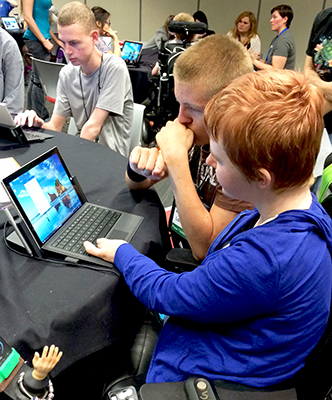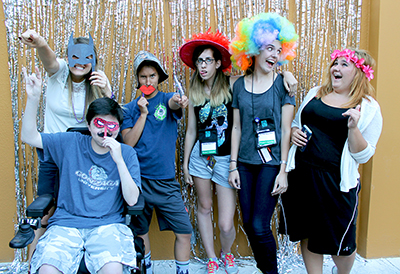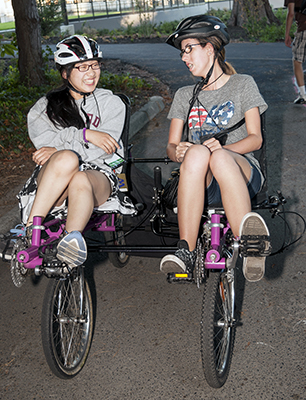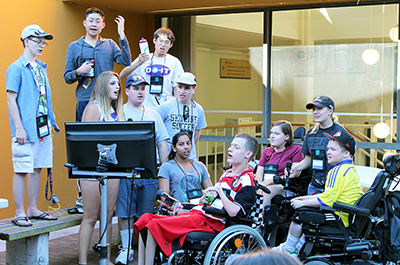Summer Study: What Do Phase I Scholars Do?
DO‑IT Phase I Scholars participate in a two-week, live-in Summer Study session on the UW Seattle campus. They learn about college life; explore the Internet; interact with peers, staff, and mentors; and have fun. The DO‑IT Scholars program started in 1993 as an experimental project for teens with disabilities nationwide. It is currently open to Washington State teens and is supported by the State of Washington, the Boeing Company, the Microsoft Corporation, and the National Oceanic and Atmospheric Administration.
Exploring Microsoft

On the first Friday of Summer Study, we took a tour of Microsoft, led by Sean Marihugh and Chris Schlechty, two DO-IT Ambassadors that work for Microsoft. During the tour, they stressed self-advocacy and universal design for Microsoft products.
Our first activity was a demonstration of Eye Gaze technology. Eye Gaze is a program that allows people to use technology, move around, and communicate using only their eyes. For this activity, a tablet was hooked up to the Eye Gaze camera, and each of us played a game.
After that, there was a panel of employees with various disabilities. We had a Q&A session, and they spoke about self-advocacy and getting accommodations in the workplace.
We were also introduced to the new Windows 10 operating system. It was quite fascinating, as the computer allowed us to draw on webpages and talk to a personal assistant named Cortana. This was our favorite part, because new technological advancements have always excited and inspired us.
Next, we participated in a team activity to design a robotic companion, including features, name, slogan, and price. Everyone created a worthy product, and we got to see a wide variety of great ideas. After the designs were completed, we concluded our visit to Microsoft. It was a great experience, and one that we will not forget.
Celebrating A Birthday With DO-IT

Katelyn’s perspective: How could you celebrate a birthday for someone you barely knew? I didn’t know until now. It’s one thing to just say “happy birthday,” but learning all about someone to celebrate your roommate’s birthday was fun. The first thing we did was help find the perfect birthday outfit. Many people like to dress up in a fancy outfit for their birthday, and Hailey definitely did. We also asked staff if we could get her a special treat, like a cupcake or special coffee. Just let them know that today is special even though they can’t be with their family and friends—they have new friends!
Hailey’s perspective: I had my first time being away from home on my birthday. It ended up being a great day. We went to Microsoft. In the evening, other Scholars got me a cupcake and sang me happy birthday. The best part of my birthday was that people wished me a happy birthday all day! By going to this program, I’ve learned not to be scared to tell people about my disability; it feels great knowing I am not the only one. I learned something this year on my birthday away from home and family—I suddenly knew it was time to be myself and not to let it bother me if others say anything about me being different.
Wrestling
Aspen: I never thought about wrestling until the wrestling coach approached me freshman year and told me to check out pre-conditioning. Two weeks later, I decided to try it out, and, before I knew it, I fell in love with the sport and ended up being on the team.
Tasha: I have been wrestling for five years. I started because one of my good friends came up to me and asked me to join so she wouldn’t be the only girl on the team. I wanted to try something new, and I ended up loving it! Now wrestling is the main sport I do every year.
Aspen: Being deaf affects my playing because I can’t wear my cochlear implant during practices or matches. This means I can’t hear what my coach is trying to tell me what to do and it’s very hard to concentrate on the interrupter. On the other hand, I am easily able to drowned out the crowd noise and additional unnecessary noises as well. Because deafness had caused me to be more aware of my surroundings and be more sensitive to what I am feeling, I am easily able to make the next movement based off sight and vibrations.
Tasha: Wrestling is a hard sport, and it doesn’t help when you have a disability. I have sickle cell. Sickle cell disease is an inherited blood disorder that causes red blood cells to break down. Having sickle cell makes is hard for me to do some of the wrestling workouts and go on long runs in the cold, because I end up in a lot of pain. This can cause me to miss school if I have to stay home and heal. However, I love the person I am, even if sickle cell helped make me who I am.
Aspen and Tasha: Wrestling is a difficult and challenging sport. It’s hard finding girls that want to be on the team and compete. We try to inspire other girls to be on our teams by talking with them and discussing their worries. We like to share our wrestling success stories and challenges. Wrestling can be challenging, especially eating the right amount to stay in your own weight class. However, wrestling can make you stronger and feel very accomplished.
The Pacific Science Center
Shortly after breakfast on Saturday, we hopped on the bus to go to the Pacific Science Center in Seattle. We first went to the IMAX theater for the movie Humpback Whales 3D, and we both enjoyed it. One thing we learned was the way the whales communicated with each other to capture fish for food. Many humpback whales surround the fish and blow bubbles, while others dive deep in the water so they can drive the fish towards more shallow water. This bubble net technique allows them to swallow thousands of fish in one gulp.
After the movie, we ate lunch outside the café. We then looked at a few small exhibits on our way to the laser dome for the Michael Jackson Laser Show. The laser show was cool because the lasers were shaped in ways that fit well with the Michael Jackson songs that were playing.
We split into groups and went to the rest of the exhibits. We visited the butterfly area and then explored the Grossology exhibit, which features facts about the human body. Finally, we visited the current research exhibit, where we were able to see an UpTempO buoy, which is what Dr. Mike Steele and his team use for polar ocean temperature research. This was great to see, since he was also the presenter for our Summer Study oceanography class.
After a busy day exploring and learning at the Pacific Science Center, we travelled back to the UW campus in time for dinner.
Having a College Roommate

After a long journey to the wonderful University of Washington campus, learning about the dorms, and meeting some of the Scholars, you still have one more adventure to attend to before dinner and rest. This is meeting your new roommate. Having a roommate is very interesting, especially when it’s your first time living in a dorm, and it gives you a connection and friend throughout Summer Study. Your roommate is probably just as excited and nervous about DO-IT Summer Study as you are.
As nice as it is to have a roommate, you still want to keep a few small things in mind. Remember to respect and be nice to each other, communicate, and look out for each other. You are both new at this and could use an ally. It’s important that you and your roommate help each other and remember you both have different strengths and weaknesses. Hold the door open, pick things up for each other, and walk to your next activity together if possible. Also be there for your roommate to talk to if they need emotional support. If you and your roommate are respectful to one another then you will become fast friends.
Sporting Events And Accessibility
Going to sporting events in Seattle is an amazing experience that will give you everlasting joy, but there are some challenges people with disabilities face when attending.
One main obstacle faced when going to sporting venues is their accessibility of seating. There are only a few wheelchair specific seats available around CenturyLink Field. If you plan on transferring out of your walker/wheelchair, there aren’t specifically allocated places where you can leave your equipment in eyesight. However, staff can take your equipment to a storage room and return it to you during half-time or as requested.
An obstacle faced by people who find it hard to hear is that there is no captioning on any of the monitors located inside the stadium, which means that you can’t get the full game experience that everyone should be entitled to.
CenturyLink field did have great staff members who provided assistance. They wanted to make sure we had a positive experience, so they made everything as accessible as they could.
What the DO-IT program has taught us is that we need to be self-advocates for what we need, and that it is okay to ask for accommodations or help. Our disabilities do not define who we are or what we do.
Karaoke Night

We both really enjoyed karaoke night! The song selection was unparalleled to any we have seen--the binder full of songs is about four inches thick! It even featured songs from musicals, which was an exciting surprise, since many of the students this year really like musicals. We also loved karaoke night because of the culture of acceptance DO-IT promotes. Even if you were a bad singer, it was easy to go up and have a good time, and there was a lot of positive support from everyone.
Another great part of karaoke night was sharing a love of music with everybody through voice. Even when you love to sing, you don’t get to show it off often. By the end of the night, some of our throats were sore from all the singing. We can’t wait for next year’s karaoke night!
How to Roll in Scooter Style
Whenever we roll through a crowd of able bodies, the looks on their faces read, “Why are they so cool, and we’re not?” Naturally, we know that they are jealous of our hot rides. The scooter is like the limo of the accessible fleet: Long and hard to drive, but surprisingly comfortable. Here are our top three tips on how to roll through life in style.
- If someone’s staring, stare back. This can make people feel awkward and look away.
- Don’t be afraid to toot your own horn. This can be helpful to tell people they are in your way. The horn is not your enemy, it’s your best friend!
- If you need something, say something! You are your best advocate. A little sass can translate into a lot of class. You have a disability—use it to your advantage!